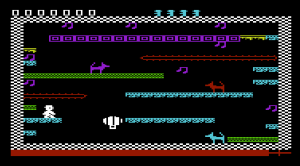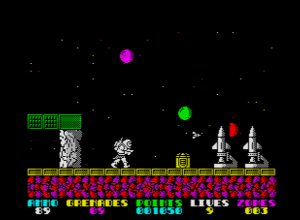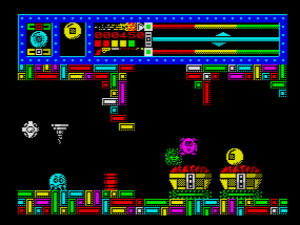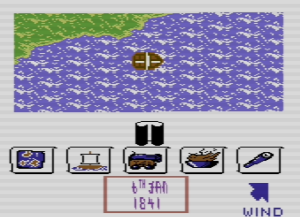
If you take too long to conquer a world monsters from ancient mythology start wandering across the sea and land causing all sorts of indescriminate trouble, a nice touch.
Happy New Year for the Space Year 2012, I hope you had a good Christmas and all of that. Now, where were we…?
This is the first part of a story about two games I’ve been playing quite a bit over the holiday period. They both have the same designer (Peter Molyneux) and share a lot of the same DNA but are separated by ten years and represent very different evolutionary stages of gaming. One is Populous II: Trials of the Olympian Gods and the other is Black & White.
Populous II I bought from Good old Games for the distinctly un-princely sum of $2.99 (that’s less than two quid in real money) during their Holiday Discount period (it’s over now, you’ll have to pay a mammoth $5.99 for it instead!). I have a lot of good memories of playing the Amiga version in the ’90s and the PC version is largely the same only with higher-resolution graphics, a few new features on full-screen mode, one extra spell and (as was typical in the early ’90s alas) poorer sound. For those who aren’t aware of Populous II it’s a god-game (in fact I think the first Populous may have been the originator of that particular label) where the player takes on the role of one of Zeus’s many demi-god children and must fight numerous opponents taken from Greek mythology (starting with figures like Pan and other demi-gods and ending with the gods of Olympus themselves) over an incredible 1000 different levels. Each level is an individual world containing followers of both the player and whoever you’re up against as well as having a number of rules (eg in some worlds water is fatal and others not, in some worlds you can raise and lower land and in others not).

A wee man representing the army of your leader leaves his villa. Maybe he's been forced-out by Coalition housing benefit cuts (satire! Or if you will, since this is ancient Greece, satyr)
To complete a level you have to defeat your opponent demi-god or deity which means you have to wipe-out his population of followers either by slowly defeating them or massively outnumbering them, building up enough mana to use a godly power called “armageddon” and have everyone change into a mythical hero and charge towards a big ruck from which only one side’s followers will emerge victorious. There are other powers to help you win as well and these are slowly handed-out to the player as he or she progresses through the game. These include the “papal magnets” which provide a focus for your followers, various godly powers (including destructive powers like rains of fire and earthquake as well as subversive ones such as the fonts which change the allignment of any army which walks through them) and the heroes, based on characters from Greek mythology, who the player’s leader (identified by the tiny papal magnet which floats next to him/her) takes the form of and who then march into the enemy’s land to do mischief based on who they are (Perseus fights people, Helen of Troy leads them away etc). Your followers will build houses and cities based on the amount of farmland they have access to so you spend a lot of time manipulating the geography until its nice and flat so that your people can multiply.
Populous II takes ages to get going, so to speak, having so many levels and a gentle learning and difficulty curve. What makes it work, though, is that it’s plain fun and the range of things you can do means there are numerous potential strategies to win. For example, on earlier stages its easiest to just create farmland, have your followers settle it and build-up mana for armageddon, the computer being too slow and dozy to build up his own followers quickly enough. Later, though, the computer gets faster and more aggressive and starts sending his followers into your territory and using godly powers to trash your land meaning you have to respond in kind and can use godly powers, heroes or even just standard armies to invade and take-over his land and defeat him more quickly (speed brings higher scores, quicker advancement through the levels, and sometimes more experience). The Populous titles have often been criticised for being “land-flattening games” because, early on especially, this is what you spend most of the time doing but the fact that you end up mixing this up with a little warfaring, self-defence and godly wrath as the game slowly opens up its wide range of features means this is a simplistic criticism. Flattening the land is also, believe it or not, quite satisfying and nimble mouse-clicking makes for faster victory (indeed, Populous II is arguably as much an action game as strategy).
Whenever I return to this game I’m surprised by how well the gameplay has aged, how much fun it still is to play and how it manages to suck you in for hours despite the more rational part of your brain claiming that there’s not quite enough variety, largely because despite all the godly powers and no matter how much you might enjoy it you are still just spending an awful lot of time flattening land. Like Black & White, which I will talk about in the next few days, Populous II is a product of a starry-eyed ideas man but in this case his grand plans have somehow created an addictive, absorbing action-cum-strategy title which offers the player a great deal of potential strategies but ultimately has less depth than I think he imagined although is arguably better for it. Can the same be said for Black & White? Does it marry the enjoyable gameplay to real depth? Ooh, let’s see in a few days shall we…
Footnote: a data disk was released for this game called The Challenge Games which took place in Japanese, rather than Greek, mythology and had both a conquest game and a series of levels based around puzzles. As far as I know, this wasn’t released for MS-DOS computers and isn’t available on GOG, a shame.













